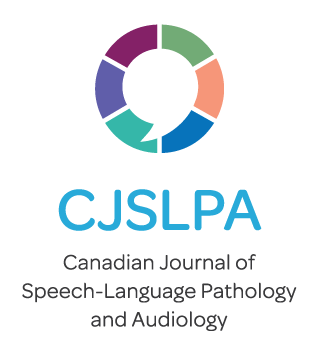

| Author(s) |
Jeannette Eadie-Rutten |
| Volume | 16 |
| Number | 3 |
| Year | 1992 |
| Page(s) | 229-242 |
| Language | English |
| Category | |
| Keywords |
hearing impairment geriatric communication access |
| Abstract |
An estimated 48% to 97% of residents in continuing care facilities are believed to have a hearing impairment. Nursing staff and other team members require education to improve communication and care of hearing impaired residents. The speech pathology department of an Ontario geriatric and chronic care teaching hospital implemented an intensive, short-term project entitled the "Hearing Education and Access for Residents (H.E.A.R.) Project" in order to address these needs within existing economic and human resources. The goals were to improve quality of life for residents by: (1) providing education to develop staff and volunteer expertise and promote hospital and public awareness; (2) identifying and visiting individuals with hearing impairment and hearing aid experience; and (3) improving communication access within the hospital. This clinical report describes one hospital's experience with Access 2000 in action. The H.E.A.R. Project components are detailed, and outcomes discussed. On estime que de 48 a 97 % des résidents des établissements de soins continus sont des malentendants. Le personnel infirmier et d'autres membres de l'équipe doivent recevoir une formation pour améliorer la communication et le soin des résidents malentendants. Le département d' orthophonie d'un hôpital de gériatrie et de traitement des maladies chroniques de l'Ontario a mis en oeuvre un projet intensif de courte durée, intitulé projet "H.E.A.R. (Hearing Education and Access for Residents)", dans le but de répondre à ces besoins en utilisant les ressources humaines et financières existantes. Le projet avait pour but d'améliorer la qualité de vie des résidents en (1) assurant la formation du personnel et des bénévoles et sensibilisant l'hôpital et le public; (2) indentifiant et visitant les personnes malentendantes qui utilisent une prothèse auditive; et (3) améliorant l'accès aux communications au sein de l'hôpital. Ce rapport clinique décrit l'expérience d'un hôpital avec Access 2000. Il décrit les composantes du projet H.E.A.R. et analyse les résultats. |
| Record ID | 349 |
| Link | https://cjslpa.ca/files/1992_JSLPA_Vol_16/No_03_177-250/Eadie-Rutten_JSLPA_1992.pdf |
CJSLPA is an open access journal which means that all articles are available on the Internet to all users immediately upon publication. Users are allowed to read, download, copy, distribute, print, search, or link to the full texts of the articles, or use them for any other lawful purpose.
CJSLPA does not charge authors publication or processing fees.
Copyright of the Canadian Journal of Speech-Language Pathology and Audiology is held by Speech-Language and Audiology Canada (SAC). Appropriate credit must be given (SAC, publication name, article title, volume number, issue number and page number[s]) but not in any way that suggests SAC endorses you or your use of the work. You may not use this work for commercial purposes. You may not alter, transform, or build upon this work.